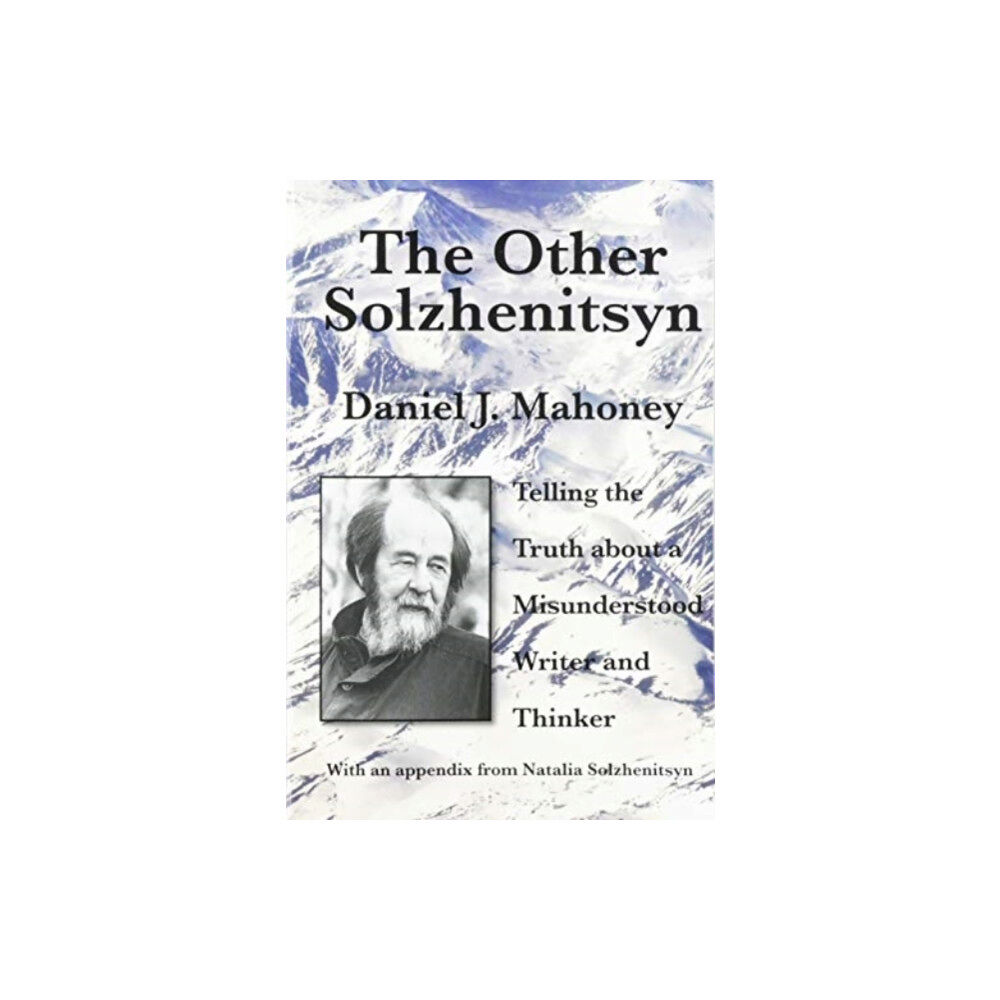- Hem
- Böcker
- Facklitteratur
- Biografier
- The Other Solzhenitsyn – Telling the Truth about a Misunderstood Writer and Thinker (häftad, eng)

The Other Solzhenitsyn – Telling the Truth about a Misunderstood Writer and Thinker (häftad, eng)
The great Russian writer Aleksandr Solzhenitsyn (1918–2008) is widely recognized as one of the most consequential human beings of the twenti...
315 kr
Bara 2 kvar
Skickas inom 2-3 vardagar
- Fri frakt
Fri frakt över 299:-
Snabb leverans
Alltid låga priser
Produktbeskrivning
The great Russian writer Aleksandr Solzhenitsyn (1918–2008) is widely recognized as one of the most consequential human beings of the twentieth century. Through his writings and moral witness, he illumined the nature of totalitarianism and helped bring down an ‘evil empire.’ His courage and tenacity are acknowledged even by his fiercest critics.
Yet the world-class novelist, historian, and philosopher (one uses the latter term in its capacious Russian sense) has largely been eclipsed by a caricature that has transformed a measured and self-critical patriot into a ferocious nationalist, a partisan of local self-government into a quasi-authoritarian, a man of faith and reason into a narrow-minded defender of Orthodoxy.
The caricature, widely dispensed in the press, and too often taken for granted, gets in the way of a thoughtful and humane confrontation with the “other” Solzhenitsyn, the true Solzhenitsyn, who is a writer and thinker of the first rank and whose spirited defense of liberty is never divorced from moderation.
It is to the recovery of this Solzhenitsyn that this book is dedicated. This book above all explores philosophical, political, and moral themes in Solzhenitsyn’s two masterworks, The Gulag Archipelago and The Red Wheel, as well as in his great European novel In the First Circle.
We see Solzhenitsyn as analyst of revolution, defender of the moral law, phenomenologist of ideological despotism, and advocate of “resisting evil with force.” Other chapters carefully explore Solzhenitsyn’s conception of patriotism, his dissection of ideological mendacity, and his controversial, but thoughtful and humane discussion of the “Jewish Question” in the Russian – and Soviet twentieth century.
Some of Solzhenitsyn’s later writings, such as the “binary tales” that he wrote in the 1990s, are subject to critically appreciative analysis. And a long final chapter comments on Solzhenitsyn’s July 2007 Der Spiegel interview, his last word to Russia and the West. He is revealed to be a man of faith and freedom, a patriot but not a nationalist, and a principled advocate of self-government for Russia and the West.
A final Appendix reproduces the beautiful Introduction (“The Gift of Incarnation”) that the author’s widow, Natalia Solzhenitsyn, wrote to the 2009 Russian abridgment of The Gulag Archipelago, a work that is now taught in Russian high schools.
Yet the world-class novelist, historian, and philosopher (one uses the latter term in its capacious Russian sense) has largely been eclipsed by a caricature that has transformed a measured and self-critical patriot into a ferocious nationalist, a partisan of local self-government into a quasi-authoritarian, a man of faith and reason into a narrow-minded defender of Orthodoxy.
The caricature, widely dispensed in the press, and too often taken for granted, gets in the way of a thoughtful and humane confrontation with the “other” Solzhenitsyn, the true Solzhenitsyn, who is a writer and thinker of the first rank and whose spirited defense of liberty is never divorced from moderation.
It is to the recovery of this Solzhenitsyn that this book is dedicated. This book above all explores philosophical, political, and moral themes in Solzhenitsyn’s two masterworks, The Gulag Archipelago and The Red Wheel, as well as in his great European novel In the First Circle.
We see Solzhenitsyn as analyst of revolution, defender of the moral law, phenomenologist of ideological despotism, and advocate of “resisting evil with force.” Other chapters carefully explore Solzhenitsyn’s conception of patriotism, his dissection of ideological mendacity, and his controversial, but thoughtful and humane discussion of the “Jewish Question” in the Russian – and Soviet twentieth century.
Some of Solzhenitsyn’s later writings, such as the “binary tales” that he wrote in the 1990s, are subject to critically appreciative analysis. And a long final chapter comments on Solzhenitsyn’s July 2007 Der Spiegel interview, his last word to Russia and the West. He is revealed to be a man of faith and freedom, a patriot but not a nationalist, and a principled advocate of self-government for Russia and the West.
A final Appendix reproduces the beautiful Introduction (“The Gift of Incarnation”) that the author’s widow, Natalia Solzhenitsyn, wrote to the 2009 Russian abridgment of The Gulag Archipelago, a work that is now taught in Russian high schools.
| Format | Häftad |
| Omfång | 256 sidor |
| Språk | Engelska |
| Förlag | St Augustine's Press |
| Utgivningsdatum | 2021-01-29 |
| ISBN | 9781587316173 |
Specifikation
Böcker
- Häftad, 256, Engelska, St Augustine's Press, 2021-01-29, 9781587316173
Leverans
Vi erbjuder flera smidiga leveransalternativ beroende på ditt postnummer, såsom Budbee Box, Early Bird, Instabox och DB Schenker. Vid köp över 299 kr är leveransen kostnadsfri, annars tillkommer en fraktavgift från 29 kr. Välj det alternativ som passar dig bäst för en bekväm leverans.
Betalning
Du kan betala tryggt och enkelt via Avarda med flera alternativ: Swish för snabb betalning, kortbetalning med VISA eller MasterCard, faktura med 30 dagars betalningstid, eller konto för flexibel delbetalning.
Specifikation
Böcker
- Format Häftad
- Antal sidor 256
- Språk Engelska
- Förlag St Augustine's Press
- Utgivningsdatum 2021-01-29
- ISBN 9781587316173
